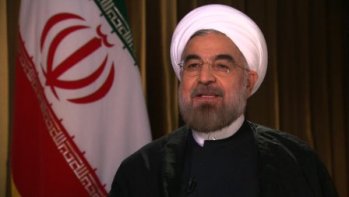 CNN) -- Iran's new president has acknowledged the Holocaust, furthering the stark contrast between himself and his predecessor.
CNN) -- Iran's new president has acknowledged the Holocaust, furthering the stark contrast between himself and his predecessor.
"Any crime that happens in history against humanity, including the crime the Nazis committed towards the Jews as well as non-Jews, was reprehensible and condemnable," President Hassan Rouhani said in an interview with CNN's Christiane Amanpour.
"Whatever criminality they committed against the Jews we condemn. The taking of human life is contemptible. It makes no difference whether that life is a Jewish life, Christian or Muslim."
He followed with an apparent reference to the Israeli-Palestinian conflict, saying it's not acceptable to "usurp the land of another group and occupy it." He called for "an even-handed discussion."
Rouhani also emphasized that he is "not a historian."
Days earlier, in an interview with NBC, Rouhani declined to say whether the Holocaust happened.
The country's previous president, the firebrand Mahmoud Ahmadinejad, infamously denied the Holocaust, calling it a "myth."
Rouhani, widely considered more moderate, has struck a positive tone and reached out to the West to improve relations, particularly with the United States.
"I would like to say to American people: I bring peace and friendship from Iranians to Americans," he said in English, marking the first time he's spoken the language in a TV interview since becoming president. For the rest of the interview Rouhani spoke Farsi.
In many ways, Rouhani is the "it" man of this week's U.N. General Assembly, as Western leaders look to gauge whether his diplomatic overtures will translate into concrete policy changes.
There was widespread speculation that he and U.S. President Barack Obama might meet face-to-face.
"There were some talks about" a possible meeting, Rouhani told Amanpour through a translator. "And preparation for the work was done a bit as well."
But no such meeting happened.
Two senior U.S. administration officials told CNN Tuesday that the encounter was called off because it was considered "too complicated" for Iran back home.
"I believe we didn't have sufficient time to really coordinate the meeting to the full extent that we needed to," Rouhani told CNN.
Still, the two men recently exchanged letters, and Rouhani said the ice is "already beginning to break because the environment is changing and that has come about as a result of the will of the people of Iran to create a new era of relations between the people of Iran and the rest of the world."
Rouhani said he has full permission from Iran's supreme leader, Ayatollah Ali Khamenei, to negotiate with the West.
"I think that the president of Iran has the authority whenever the national interest of the country is involved," Rouhani told Amanpour. "The supreme leader of Iran has said that should negotiations be necessary for the national interest of the country, he is in fact not opposed to it."
"Now, if an opportunity was created today, had arisen today," the Iranian president said, "and the prep work for that had been done, most probably the talks would have haven taken place, primarily focused on the nuclear issue or the developments on the Middle East. Therefore the supreme leader, I can tell you, has given permission for my government to freely negotiate on these issues."
Christiane Amanpour's full interview with President Hassan Rouhani will air at 11 a.m. Wednesday on CNN International.
- Home
- News
- Opinion
- Entertainment
- Classified
- About Us
 MLK Breakfast
MLK Breakfast- Community
- Foundation
- Obituaries
- Donate
11-07-2024 11:09 pm • PDX and SEA Weather














































































































































































































































































































